Legal Considerations When Leveraging ChatGPT and LLMs for Your Business
There are several legal considerations that businesses should keep in mind when leveraging ChatGPT, a popular language model, for their operations. As artificial intelligence technology continues to advance, it is crucial to navigate the legal landscape associated with its use in a responsible and compliant manner. ChatGPT is now
Understanding ChatGPT
ChatGPT is a state-of-the-art language model developed by OpenAI. It uses deep learning techniques and trained on diverse data to generate human-like responses in natural language conversations. Many businesses have now started to integrate ChatGPT APIs into their chat systems, customer support platforms, and other interfaces to improve user experience and provide efficient virtual assistance.
Intellectual Property Rights
When using ChatGPT, it is vital to consider the ownership and protection of intellectual property rights. The training process of ChatGPT involves feeding it with vast amounts of text data, which may include copyrighted material. Businesses should ensure that their use of ChatGPT does not infringe upon any intellectual property rights, including copyrights, trademarks, or patents. If your business intends to create and train its own conversational model, you should also be cautious about inadvertently incorporating protected material into the training dataset.
Data Privacy
As ChatGPT engages in conversations with users, it may collect and process personal data. Businesses need to comply with relevant data privacy and protection laws, such as the General Data Protection Regulation (GDPR) or any applicable local laws depending on their jurisdiction. Transparent data collection practices, consent mechanisms, and data security measures become crucial factors for compliance purposes. Furthermore, businesses must clearly communicate to users how their personal data is being collected, used, and stored when leveraging ChatGPT.
Bias and Discrimination
Language models like ChatGPT can inadvertently learn and perpetuate biases present in their training data. These biases may lead to discriminatory responses or unethical behavior, which could have legal implications. It is essential for businesses to address potential bias issues proactively by fine-tuning and testing models in a thorough manner. Regular audits and assessments are necessary to minimize any discriminatory outputs and ensure compliance with anti-discrimination laws and regulations.
Terms of Service and User Agreements
When deploying ChatGPT, businesses should have clear Terms of Service and User Agreements in place. These agreements should outline the rights and obligations of both the business and the users in relation to the use of ChatGPT. They should cover areas such as disclaimers, limitations of liability, data usage and retention policies, as well as any specific terms regarding the AI-generated content. Ensuring that users explicitly agree to these terms before using the services can help protect the business from potential legal disputes.
Consumer Protection and Misrepresentation
Businesses should be cautious about using ChatGPT for communication that may have legal consequences. Providing legal advice or making legally binding statements through an AI-powered chat can expose businesses to potential claims of misrepresentation. It is crucial to properly educate users about the limitations of ChatGPT and avoid creating an impression that the AI represents a qualified professional or has legal expertise. Implementing disclaimers and clear communication that ChatGPT's responses are generated solely based on algorithms, without legal expertise, can help mitigate such risks.
Disclaimer: This article is intended for informational purposes only. It is not intended to be a substitute for professional legal advice or judgment. Readers should not act upon the information contained in this article without seeking professional legal counsel. The author and publisher of this article are not responsible for any actions or decisions taken based on the information presented in this article.C.


